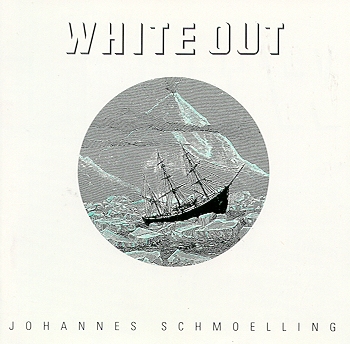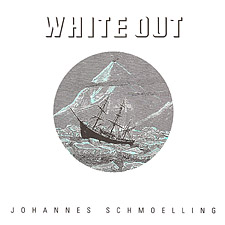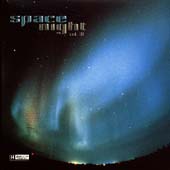Plötzlich war da ein Gefühl, die Antarktis, ein Konzeptalbum. Nein, nicht plötzlich.
Plötzlich, das war der Schnittpunkt dreier Dinge, die zur gleichen Zeit stattfanden: ein Buch
(Christoph Ransmayrs „Die Schrecken des Eisens und der Finsternis“), ein Film
(„Antarctica Project“ von Axel Engstfeld), schließ eine eigene Arbeit, ein
experimentelles Hörstück, an dem ich zusammen mit dem Autor Martin Burckhardt
arbeitete. Und in diesem Sinn war „plötzlich“ nichts Zufälliges, sondern das
Gefühl einer inneren Zwangsläufigkeit: ein Konzeptalbum, die Antarktis.
In dem Film war ein Mann zu sehen, vor einer amerikanischen Fahne, der davon sprach, daß
die Antarktis ein ungeheueres Energie- und Bodenschatzreservoir darstellte. Er hatte eine Stimme,
als ob Geld sprechen könnte. „I have no doubt“, sagte die Stimme „it will
happen. Twenty years, thirty years, it will happen.“
Eine Landschaft erzählen - solange sie noch existiert.
Landschaft. Und eine Musik, die Raum schaffen kann. Über den Umweg der Antarktis, über
den leeren, weißen Raum begriff ich, daß dies eigentlich immer meine Idealvorstellung
von dem gewesen war, was Elektronische Musik erzählen könnte. In eine weite, offene
Landschaft aufzubrechen. Wobei ich das Neue, das Unerhörte der elektronischen Klänge
eigentlich niemals als ortlosen Punkt, als Phantom der Schwerelosigkeit begriffen habe, sondern
immer als etwas ganz diesseitiges, „von dieser Welt“. In Ermangelung jenes Bedürfnisses,
mich ins Weltall hinauskatapultieren zu lassen (man sagt, daß auch dort, trotz all der
Sphärenklänge, der Satellitenmüll sich bedenklich häuft) habe ich es
vorgezogen, mich auf das zu beschränken, was mir geläufig ist. Das heißt: man
läuft - anstatt durchs Schwerelose zu taumeln.
In diesem Sinn wollen auch die Klänge, die ich benutzt und verfremdet habe, ihre Herkunft gar
nicht verleugnen. Es sind Geräusche: der Klang eines Sonars, das Knacken und Piepsen der
Funkgeräte, Maschinen, das ferne Kreischen der Vögel - und wenn man die Augen
schließt, verbindet sich mit jedem Geräusch sogleich die Vorstellung einer Landschaft,
einer Umgebung. Was ein Grund für mich war, ganze Geräuschpassagen zu komponieren
- wie eine Art Untergrund, aus dem die Musik erst hervorgeht.
In einem naturwissenschaftlichen Buch über die Atarktis las ich von einem optischen
Phänomen, das sich, bei bestimmten Temperatur- und Luftverhältnissen, einstellt:
WHITE OUT. Es ist ein Verlust des Raumgefühls, die Weiße radiert den Raum aus,
Himmel und Erde fließen zusammen, es entsteht ein Raum ohne Tiefe, ohne Horizont.
Vielleicht ist ein Konzeptalbum nichts anderes als eine Reise. Ein Aufbruch an einen Ort, der sich
allmählich erschließt, eine Küste, die näherkommt und sich zu einem
Eisgebirge auftürmt. Ankunft, die sich bereits in den Funksprüchen ankündigt, im
Wummern der Maschinengeräusche, in der Unterhaltungsmusik, die den Mannschaftsraum
füllt. Und plötzlich ist da (wo auf der Landkarte nur ein riesengroßer weißer
Fleck gewesen ist) fester Boden unten den Füßen und man sieht: Müll,
Essensrückstände und Konservendosen, gleichsam für alle Ewigkeit aufbewahrt,
abgelassene Ölrückstände und eine Reifenspur, die zum Horizont führt, wo
sich eine Industrieansiedlung erhebt, und nunmehr, unvermittelt: das Gefühl, daß sich
hier, am Ende der Welt, ein Krieg ankündigt, daß die Maschinen in Position gestellt,
daß die Fronten markiert sind. Und wenn man sich umschaut, ist da die älteste
Landschaft der Welt. (Ein Krieg, mit dem Ziel, die Geschichte der Natur auzuradieren: WHITE OUT).
Vielleicht ist die Landschaftsmalerei etwas sehr Altmodisches, etwas aus dem Neunzehnten
Jahrhundert, als die Leute noch Zeit dazu hatten. Vielleicht ist der Versuch, genau
zuzuhören, etwas sehr Altmodisches. Vielleicht ist es überhaupt altmodisch, an die
Zukunft zu denken.
Womit natürlich gesagt sein soll, daß diese Art, altmodisch zu sein, irgendwann, ganz von
selbst, brandaktuell sein wird.
Als ich die Arbeit an dem Album beendete, brachen Reinhold Messner und Arved Fuchs in die
Antarktis auf. Nicht mehr (wie im letzten Jahrhundert), um die weißen Flecken von der
Landkarte zu tilgen, auch nicht (wie um die Jahrhundertwende) mit dem Ziel, die Fahne
irgendeines Landes dort aufzustecken, sondern allein der Landschaft, ihres puren
So-und-nicht-anders-Seins (der Gegenwart) wegen. Und ich dachte, früher, als Kind, da
hätte ich es mir nicht trämen lassen, das selbst das Spaziergehen eines Tages zu einem
politischen Akt werden könnte.
Johannes Schmoelling, 1990.
|
All of a sudden there was this feeling, the Antarctic a concept album.
No, it was not so sudden. This sudden was the crossover point of three
things, all happening at the same time: a book (Christoph Ransmayrs "The
terrors of the ice and the darkness"), a movie film ("Antarctica Project"
by Axel Engstfeld), and finally a own study, an experimental sound
performance, on which I was working together with the author Martin
Burckhardt. And in this sense the "sudden" was nothing incidental, but a
feeling of an inner inevitableness: a concept album, the Antarctic.
In the movie a man was seen, in front of the American Flag, who pronounced
the Antarctic as an immense reservoir of energy and resources. He had a
voice as if money could speak. And the voice said: "I have no doubt, it
will happen. Twenty years, thirty years, it will happen."
To tell a landscape - so long as it still exists.
Landscape. And a music that can create space. Via the detour of the
Antarctic, via the empty white space I realized that this was really always
my idealistic intuition of what Electronic Music could tell. To start for a
spacious open landscape. Whereby I never understood the newness
and the unheard-of fo the electronic sounds as a placeless point, as a phantom of
weightlessness, but always as something on this side, "as from this world."
Not having the want to have me catapulted into the universe (it is said
that in spite of all the sperical sounds the satellite garbage is
piling up considerably) I preferred to limit myself to what is familiar to me.
That means: running - instead of tumbling through weightlessness.
In this sense the sounds that I have used and changed will in no way deny
their origin. They are noises: the sound of a sonar, the crackling and
squeaking of radio sets, machines, the far away screeching of birds - and if
we close our eyes then with each noise we immediately connect to some image
of a landscape or surroundings. For me this was a reason to compose entire
noise passages - a kind of foundation out of which the music actually is
born.
In a scientific book on the Antarctic I read of an optical phenomena, which
occurs under certain conditions of temperature and of the air: WHITE OUT.
It is a loss of space sensation, the white erases the space, sky and earth
flow into each other, a space without depth and without horizon is created.
Maybe a concept album is nothing else but a voyage. A departure to another
place, which slowly uncovers itself, a shore that comes closer and piles up as
a mountain of ice. Arrival, first announced over the radio, the
whir of the machine noises, the entertainment music, filling up the crewmens room.
And suddenly (where on the map appeared just an immense white spot),
there is firm ground under your feet and you see: garbage, food throwouts,
tin cans, as if to be preserved for eternity, discarded oil residue and
a tire rut leading to the horizon, where an industrial complex arises, and
then unconsciously: the feeling that here at the very end of the world a
war announces itself, that the machines are already in position, that the
fronts are lined up. And when you look around, there is the oldest
landscape in the world. (A war with the purpose of eradicating the history
of nature: WHITE OUT.)
Perhaps the painting of landscapes is something old fashioned, something
from the 19th century, when people still had the time for it. Perhaps
the attempt to listen carefully is something very old fashioned. Perhaps
it is altogether old fashioned to think of the future.
With which of course it is meant, that this kind of being old fashioned
will sometime and completely by itself be a brand new actuality.
As I finalized the work on the album Reinhold Messner and Arved Fuchs
departed for the Antarctic. Not like before (as was still done in the last
century) to remove the white spots from map nor with the aim (as at the
turn of the century) to hoist the flag of everywhich country, but solely
because of the landscape itself, purely because of its being such and nothing
else (at the present time). And I thought that as a child, even in my
wildest dreams, it never occurred to me that just taking a walk could
one day become a political act.
Johannes Schmoelling, 1990.
(translation by John Battema, revised by Andreas Hedler, 1999)
|


